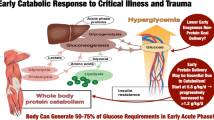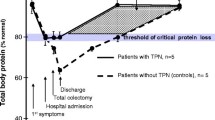Summary
Critically ill patients are prone to develop a so-called protein-calorie malnutrition, which is associated with poor clinical outcome. Therefore, over the last few years the nutritional state of the critically ill patient has increasingly gained interest. Parenteral nutrition made it possible to provide nutritional support bypassing the via naturalis. But the physician must be aware that parenteral nutrition is an invasive therapy interfering with the homeostasis of the body and fraught with risk. Thus, risk-benefit analysis and monitoring are necessary if the parenteral route is chosen instead of the more physiologic oral or enteral route. The goal of this article is to discuss indications and possible side-effects of parenteral nutrition as well as methods of therapy monitoring and the estimation of calorie requirements. The special situation of patients with hepatic or renal insufficiency is also discussed.
Zusammenfassung
Aufgrund der Erkenntnis, dass kritisch Kranke zur Entwicklung einer sogenannten Energie-Protein-Malnutrition praedestiniert sind, welche im Weiteren mit einer erhöhten Komplikationsrate einhergeht, bestand in den letzten Jahren wachsendes Interesse am Ernährungszustand kritisch Kranker. Mit der parenteralen Ernährung hat sich eine Behandlungsmethode etabliert, die es möglich macht, Nährstoffe in ausreichender Menge unter Umgehung der via naturalis zuzuführen. Allerdings muss sich der Arzt bewusst sein, dass es sich bei der parenteralen Ernährung um einen in die Körperhomöostase eingreifenden Prozess handelt, der durchaus mit Risiken behaftet ist. Deswegen bedarf es überlegter Nutzen-Risikoabschätzung sowie regelmäßigen Therapiemonitorings, wenn statt der physiologischeren oralen oder enteralen Route der parenterale Weg beschritten werden soll. In diesem Artikel sollen neben Indikationen und möglichen Komplikationen der parenteralen Ernährung auch Methoden des Therapiemonitorings und der Abschätzung des Energiebedarfs sowie die besondere Situation bei Patienten mit Leber- oder Niereninsuffizienz diskutiert werden.
Similar content being viewed by others
Author information
Authors and Affiliations
Additional information
Eingegangen: 5. August 2002 Akzeptiert: 26. September 2002
Serie: Die Intensivtherapie in der Gastroenterologie Herausgegeben von J. Schölmerich (Regensburg)
Correspondence to Christiane Girlich
Rights and permissions
About this article
Cite this article
Girlich, C. Parenterale Ernährung. Intensivmed 40, 71–85 (2003). https://doi.org/10.1007/s00390-003-0355-6
Issue Date:
DOI: https://doi.org/10.1007/s00390-003-0355-6




